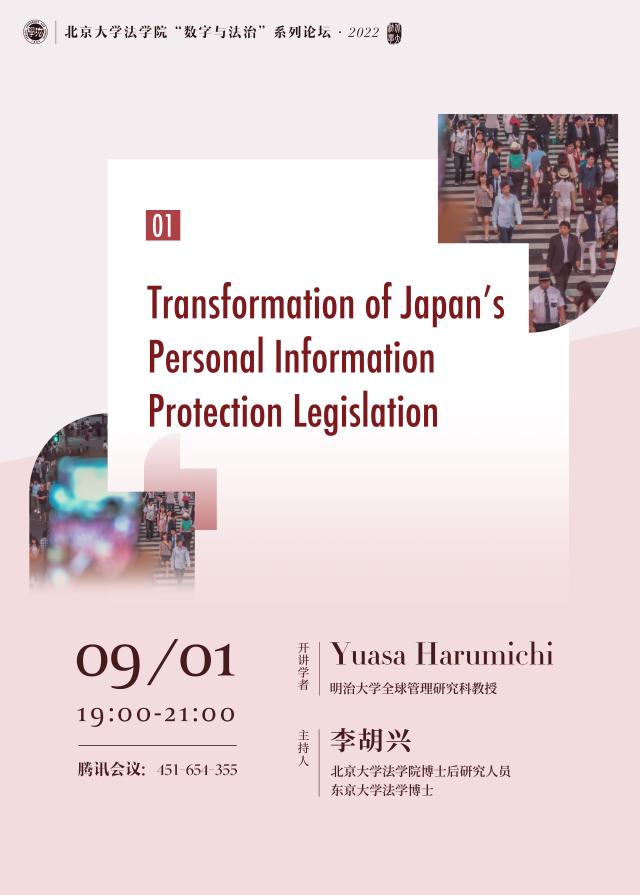题目:Transformation of Japan's Personal Information Protection Legislation (日本个人信息保护立法的转变)
时间:2022年9月1日(周四)19:00-21:00
腾讯会议 ID:451 654 355
开讲学者:Yuasa Harumichi(汤浅 垦道)(明治大学全球治理研究科教授)
主持人:李胡兴(求一个安全的网赌网站(中国)有限公司博士后研究人员、东京大学法学博士)
开讲学者简介:
Yuasa Harumichi(汤浅 垦道)教授自2021年起任明治大学全球治理研究科教授。其研究重点为隐私保护和个人信息保护、网络安全、互联网选举活动和电子投票等。此外,他还在许多组织任职,包括总务省信息与通信政策研究所研究员、法务省立法委员会委员、日本数据通信协会电信个人信息保护促进中心咨询委员会主席。
Professor Yuasa Harumichi has been Professor at Graduate School of Governance Studies, Meiji University since 2021. His research is focusing on legal and political aspects of internet and information society including protecting privacy and personal information, cyber security, internet election campaign and e-voting. He is also serving to a lot of organizations including Fellow, Ministry of Internal Affairs and Communications, Information and Communication Policy Research Institute; Member of the Legislative Council of the Ministry of Justice; Chairman, Japan Data Communication Association Telecommunication Personal Information Protection Promotion Center Advisory Committee.
讲座摘要:
本讲座将重点阐述日本个人信息保护立法的特点及近年来发生的变化。日本个人信息保护立法的特点可以归纳为三点。第一,将宪法规定的隐私权和《个人信息保护法》这两个独立的概念并列,后者是一部规范企业和其他实体的法律。隐私权是在美国的影响下发展起来的,而个人数据保护法是在欧盟的影响下形成的。第二,该法律制度反映了日本组织上的科层制传统。第三,对企业经营者的法律制裁是宽松的,主要让他们受舆论和其他形式声誉的影响。日本个人信息保护立法最近的一个重大变化是,从2023年起将统一《个人信息保护法》《行政机关个人信息保护法》和《独立行政法人信息保护法》,并将统一各地方政府的个人信息保护条例内容。本讲座还将讨论日本个人信息保护立法未来需要考虑的问题,如数据本地化要求以及司法和立法部门对个人信息的保护。
This lecture will explain the characteristics of Japan's personal information protection legislation and the changes that have occurred in recent years. The features of Japan's personal information protection legislation can be summarized into three. The first is the juxtaposition of constitutional privacy and the Personal Information Protection Law, which is a law regulating businesses and other entities, as two separate concepts. The right to privacy was developed under the influence of the U.S., and personal data protection laws were developed under the influence of the EU. Second, the legal system reflects the Japanese organizational tradition of sectionalism. Third, legal sanctions against business operators are loose, leaving them to public opinion and other forms of reputation. A major recent change is the unification of the Personal Information Protection Law, the Law for the Protection of Personal Information of Administrative Organs, and the Law for the Protection of Personal Information of Independent Administrative Institutions from 2023, and the unification of the contents of the personal information protection ordinances of each local government. This lecture will also discuss future issues to be considered, such as data localization requirements and the protection of personal information in the judicial and legislative branches.
讲座海报:

